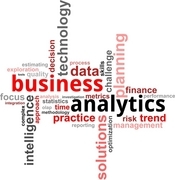The potential upside of big data is significant. Organizations, empowered by the ability to extract actionable insights from massive volumes of digital information from a variety of data sources, can (ideally) make our world a better place.
But before we get too dewy-eyed and sentimental, it's important to know that big data has a potential dark side as well, where governments and corporations use this newfound wealth of information for nefarious purposes.
These and other data-related developments are examined closely in "Big Data: A Revolution That Will Transform How We Live, Work and Think," a new book by co-authors Viktor Mayer-Schonberger, a professor of Internet governance and regulation at Oxford University, and Kenneth Cukier, data editor of The Economist and a frequent commentator on big data developments.
In a phone interview with InformationWeek, Mayer-Schonberger said that while big data shows tremendous potential in a variety of industries, such as healthcare, e-commerce and traffic prediction, it has a potential "dark side" as well.
[ Big data has the potential to both improve the quality of healthcare and save money, but it will require structure and oversight. Read Big Data Use In Healthcare Needs Governance, Education. ]
Predictive analytics, for instance, can help healthcare providers and insurers increase efficiency and reduce costs. But in the wrong hands, this technology can also empower companies to deny needed treatment to patients.
First, the bright side: Using big data analysis, such as the sequencing of DNA and enzymes in the body, medical professionals can more accurately tailor drug doses to each individual patient. "Take aspirin as a classic example. The dosage of aspirin that you're getting today, when you buy it over the counter, is designed for the average male," said Mayer-Schonberger. "But every human being has a different metabolism, a different genetic disposition. So some would need a higher dosage, others would need a smaller dosage, based on these individual traits."
And then there's the ominous dark side.
Mayer-Schonberger painted a bleak, "Minority Report"-style scenario in which a healthcare provider or insurer uses predictive analytics to deny a needed medical procedure: "Unfortunately, you can't have life-saving surgery because you're predicted to take up smoking in three years, and that won't work with your new heart," he said.
In their book, Mayer-Schonberger and Cukier draw a clear distinction between two popular data industry buzzwords: digitization and datafication. "If you scan a book's page, it's digitized but it's not datafied yet, because you can't search for words on it," said Mayer-Schonberger. However, when you apply optical character recognition (OCR) software to transform that scanned page to digitized text, you've "datafied" the information by enabling word search and other data-processing possibilities.
The authors also describe how a growing class of "data intermediaries" is aggregating data from multiple sources and processing it in innovative ways.
For instance, Inrix, a Kirkland, Wash.-based traffic analysis company, gathers real-time geolocation data from 100 million vehicles in Europe and North America, as well as from drivers' mobile phones via a free smartphone app. The firm combines this data with information from historical traffic patterns, weather reports and other local events to predict traffic flow. The finished product is then sent out to vehicle navigation systems.
"[Inrix] collects its information from rival car companies and thereby generates a product more valuable than any of them could have achieved on its own," Mayer-Schonberger and Cukier write. "Each carmaker may have a few million data points from its vehicles on the road. Though it could use the data to predict traffic flows, those predictions wouldn't be very accurate or complete. Quality improves as the amount of data increases."
People need to understand that big data isn't about servers, Hadoop and infrastructure, Mayer-Schonberger told InformationWeek. "It's really about understanding what we can do with data, and the potential behind it," he said.
Attend Interop Las Vegas May 6-10 and learn the emerging trends in information risk management and security. Use Priority Code MPIWK by March 22 to save an additional $200 off the early bird discount on All Access and Conference Passes. Join us in Las Vegas for access to 125+ workshops and conference classes, 300+ exhibiting companies, and the latest technology. Register today!
